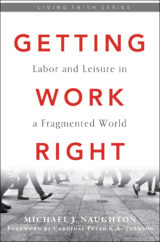By Michael Naughton
Dr. Michael Naughton is the director of the Center for Catholic Studies at the University of St. Thomas (Minnesota). He holds the Koch Chair in Catholic Studies and is a full professor in the department of Catholic Studies. Dr. Naughton also serves as board chair for Reell Precision Manufacturing. He helped coordinate and write the Vocation of the Business Leader issued by the Dicastery for Promoting Integral Human Development, which has been translated in over fifteen languages. He is the author, co-author, and co-editor of ten books and over fifty articles, including Getting Work Right: Labor and Leisure in a Fragmented World.

The importance of the Sabbath and my need for Sunday became clear to me in 1999. Ironically, it was the year I received my first sabbatical (a word with the same root as Sabbath, which means “to rest”) at the University of St. Thomas. My sabbatical was anything but an experience of rest: gutting the upstairs of our dilapidated house, running a major international conference in India, finishing a book. Although my routine changed that year, my habits of overworking were much the same. But this was soon to change.
That year I was asked to give a paper at an academic conference in San Francisco. Immediately before presenting the paper, I was struck by an anxiety attack that challenged my ability to do in a way I had ever before experienced. My breath seemed to fail me, and as much as I tried, I could not muster the will power to overcome this sudden inability to speak in public.
I was on the verge of leaning over to my introducer to tell him I could not give my presentation and looking for the nearest exit. But I was too late. He began his introduction, and my panic grew worse. Now I had to talk. Just say one word, I thought to myself, then the next, then the next. As I spoke, my voice quivered, and I had to deliver the words slowly, fearing that I would lose my ability to speak, as if the oxygen in my lungs were running out. It was one of the most humbling, perhaps even humiliating, experiences of my professional life.
The event left me feeling vulnerable. I began to search for the cause of this anxiety, this threat to my doing. Was it a physical problem? Was I drinking too much coffee? Not getting enough sleep? Working too hard? Was it a spiritual problem? Was I becoming too arrogant in what I was doing? Was the Lord teaching me a lesson in humility? In my anxiety, my mind whirled from one possible explanation to the next.
During the same year, my wife, Teresa, and I were becoming increasingly aware of the importance of Sunday and its Sabbath role, as we prepared for the Jubilee Year in 2000. Up to that time, Sunday was for us a different kind of day, but not a special day. It was different because of our pattern of going to church, making a mid-morning brunch, and watching or playing a sport in the afternoon. But it was not a day of rest. Even worse, Sundays tended to bring along a rather depressing feeling that set in especially in the late afternoon or early evening. I would find myself in a funk, experiencing a certain low-grade depression, a feeling of emptiness, and lack of meaning, what someone once coined “Sunday neurosis.”
Hoping to change all that, Teresa and I made a commitment in 1999 not to work on Sundays. I would stop working in the morning before the kids were up, and both of us would set aside house projects that we did not get to during the week. I distinctly remember the feeling of that first Sunday. It was like Christmas morning.
Sunday mornings have now become the most powerful time of the week for us. Setting aside the weekly Sabbath time has made our marriage better and stronger; I would even go so far to say that it has saved our marriage. Our relationships with our children are richer, and our relationships with God are more personal, even in the midst of family struggles and our own continuing immaturities.
On the other six days of the week, when I wake up, my work is waiting for me—sometimes actually pressing down on me. But on Sunday mornings, what awaits me is rest; not only a rest from work, but a rest in a reality that is beyond my doings and achievements, a rest that is asking me to receive reality rather than to change it. Most deeply, it is a resting in Christ.
I wish I could say that because of my Sunday observance I no longer get nervous before talks, that I never get depressed on Sunday afternoons, that our family Sabbath time is a continual experience of harmonious bliss, but this would not be true. The world is still fallen, and I am still battling sin. In keeping with its very nature, the Sabbath command is not simply instrumental, its goodness or usefulness to be measured by my success in various aspects of life.
The power of Sunday is in the rest it provides, not the work it produces; in receptivity, not in activity; in its celebratory affirmation of the deeply ordered goodness of creation, all of which nurtures our relationship with Christ. Its power is in moving us from a focus on ability, talent, achievement, and calculating results, and toward the healthy and necessary realization of what is done to and for us—all that can only be received and accepted—and ultimately toward the grace that points us to what is authentically human, to who we should be. It is a holy time, not for us to work on things but for God to work on us.
You Might Also Like

The divided life is a temptation so built into our society, we may not even recognize it. Yet most of us fall prey to it. We either undervalue work, resenting it as simply a job, or we overvalue it as an identity-defining career. Michael Naughton, drawing on his background in both business and theology, proposes that the key to finding balance is another important human activity: leisure. In light of leisure—not mere amusement, but time for family, silence, prayer, and above all, worship—work becomes a space where men and women can find deep fulfillment. Naughton provides real-world examples of how businesses can promote authentic human flourishing and innovation through practices and policies that support leisure.
In Getting Work Right Michael Naughton will change how you work—and rest.

